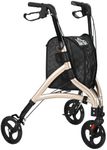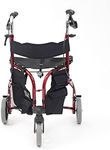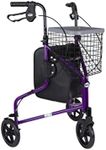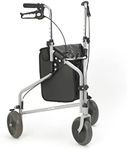Buying Guide for the Best 3 Wheel Walkers
Choosing the right 3-wheel walker can significantly enhance mobility and independence for those who need a little extra support while walking. These walkers are designed to be lightweight, easy to maneuver, and provide stability. When selecting a 3-wheel walker, it's important to consider your specific needs, such as where you'll be using it most often, your physical condition, and any additional features that might be beneficial for your lifestyle. Understanding the key specifications will help you make an informed decision that best suits your requirements.Weight CapacityWeight capacity refers to the maximum weight that the walker can safely support. This is crucial for ensuring the walker's stability and safety during use. Typically, 3-wheel walkers have weight capacities ranging from 200 to 300 pounds. It's important to choose a walker that can comfortably support your weight to avoid any risk of damage or accidents. If you're close to the upper limit of a walker's weight capacity, consider opting for a model with a higher limit to ensure durability and safety.
Walker WeightThe weight of the walker itself is important for ease of use and transport. Lighter walkers are easier to maneuver and lift, which is beneficial if you need to transport the walker frequently or have limited strength. Most 3-wheel walkers weigh between 10 to 15 pounds. If you plan to use the walker primarily indoors or need to carry it up and down stairs, a lighter model might be more suitable. However, if you need more stability, a slightly heavier walker could be beneficial.
FoldabilityFoldability refers to how easily the walker can be collapsed for storage or transport. This feature is particularly important if you have limited space at home or need to take the walker in a car. Most 3-wheel walkers are designed to fold compactly, making them convenient for travel. If you frequently travel or have a small living space, look for a walker that folds easily and compactly. Ensure that the folding mechanism is simple enough for you to operate without assistance.
Wheel SizeWheel size affects the walker's ability to handle different terrains. Larger wheels, typically 8 inches or more, provide better stability and are easier to maneuver over uneven surfaces like grass or gravel. Smaller wheels are more suited for indoor use on smooth surfaces. Consider where you will be using the walker most often. If you plan to use it outdoors or on rough terrain, opt for larger wheels. For primarily indoor use, smaller wheels may suffice.
Braking SystemThe braking system is essential for safety, allowing you to control the walker's speed and stop it when necessary. Most 3-wheel walkers come with hand brakes similar to those on a bicycle. It's important to ensure that the brakes are easy for you to operate and provide a secure stop. If you have limited hand strength or dexterity, look for a walker with brakes that are easy to engage and release. Test the brakes to ensure they are responsive and reliable.
Storage OptionsStorage options refer to any baskets, pouches, or trays that come with the walker for carrying personal items. This feature is useful for carrying essentials like a water bottle, phone, or small shopping items. Consider what you typically need to carry with you and choose a walker with adequate storage solutions. If you often run errands or need to carry medical supplies, look for a walker with a spacious and easily accessible storage compartment.
















